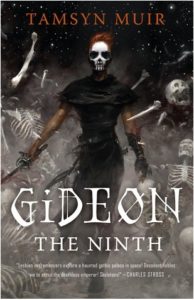How would a sword-and-sorcery author who basically wanted to have a hell of a lot of fun write in the twenty-first century? They’d write like Tamsyn Muir does in Gideon the Ninth, I think.
“In the myriadic year of our Lord—the ten thousandth year of the King Undying, the kindly Prince of Death!—Gideon Nav packed her sword, her shoes, and her dirty magazines, and she escaped from the House of the Ninth.” (p. 15)
How’s that for an irresistible opening? Why does she have both a sword and dirty magazines? Who is this King, this Prince? What is the House of the Ninth and why does Gideon want to escape? Muir doesn’t spell out any of it right away, and at least one of those questions isn’t answered at all in the entirety of the book, but the first paragraph sets the story’s frenetic pace, light touch, and merciless mashup of times and genres.
The story has some of the furniture of science fiction — there are spaceships, and a civilization that spans different planets with at least some implication of interstellar travel, plus some biotechnology and advanced mechanical thingies — but it’s a fantasy story, at least in this first volume of the series. The House of the Ninth is all about necromancy, and Muir hints that the Emperor is himself an immensely powerful necromancer served by a small elite force of similarly puissant sorcerers known as Lictors.
Gideon herself is one of only two young people in the only settlement on the planet, and as the first paragraph shows, she wants nothing more than to get the hell out of Dodge. Not many pages further into the book, readers learn that the Ninth House is run by a pair of priests who are much more dead than undead (although everyone else doesn’t notice, or pretends not to notice in the interest of not joining the ranks of the dead and undead), kept in motion by Harrow, the only other young person in the settlement and, not coincidentally, the daughter of the propped-up pair. Harrow also delights in foiling Gideon’s attempts to escape the House of the Ninth. It’s a funnily toxic sibling rivalry with side orders of swashbuckling, since Gideon is training to be a serious fighter, and death magic, since Harrow is a high priestess of a necromantic order. Until one day.
The Emperor is running out of Lictors and summons representatives — a sorcerer and a cavalier — of each of the nine Houses to the planet of the First, to unravel the secrets of Canaan House and become, possibly, Lictors themselves. Each of the Houses has traditionally played a different role in the Empire, and their approaches to magic (mostly but not always necromancy) differ appropriately. They are also all putting on a show in one way or another, displaying their power and hiding any weaknesses, of which there are far more than any let on.
Many things are not as the representatives expect. Canaan House is more of a ruin than an imperial palace or great temple. It is virtually uninhabited, and the few priests present are more cryptic than helpful. Further, some of the tests on the path to Lictor-hood prove to be deadly. Nor can they be solved by any one pair of representatives; the rivals must cooperate or fail. Still further, someone or something is trying to kill the representatives of the Houses. Is it a dreadful legacy of the past haunting Canaan House? Is it the rival Houses? Both? More?
The sword and sorcery turns into a locked room mystery turning into a series of puzzles, and hijinks very much ensue. Snappy dialog, changing factions, unexpected romantic entanglements and plenty of sarcastic mockery move the book forward quickly and excitingly. Harrow and Gideon are as a mismatched pair as any in fantasy, and yet their story does just what heroic tales from the genre have been doing all along, updated for the 2020s.
+++
This was the perfect book for Doreen. Her correspondingly enthusiastic review is here.


1 pings
[…] not generally known for bland probity, Harrow stands out. Readers of this book’s predecessor, Gideon the Ninth, know it; anyone wandering in on this book as the starting point in the Locked Tomb series (not […]